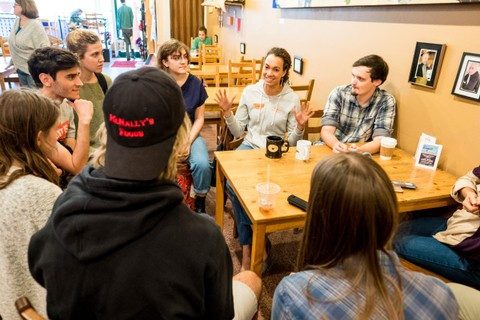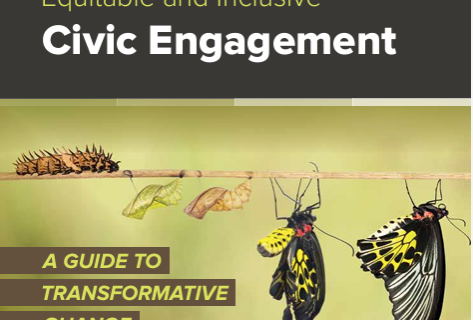Mission:
To engage and equip the next generation of equity-minded, civic agents.
Vision:
In concert with their overarching academic and post-graduate ambitions, every Grinnell College student will gain the insights and skills necessary to articulate and act upon their civic values and goals in an intentionally self-aware, sustainable, and equitable manner.
Commitment:
Civic Education and Innovation staff members at Grinnell are committed to providing civic learning opportunities that equip students to become equity-minded and innovative civic agents. During their time at Grinnell, students are encouraged to discern, explore, and assess what their civic role might be in any given setting. Through mentored experiential learning opportunities and reflection students gain the self-awareness, skills, and mindsets necessary to become intentional civic agents in an array of arenas. This approach acknowledges our global student body and the fact that communities emerge and govern themselves in many contexts– in one’s family, dorm, neighborhood, workplace, region, nation, etc. Our approach also acknowledges that constructive change-making necessitates the filling of many civic roles. Some volunteer to make small changes or meet immediate needs. Some make concrete plans for others or manage projects. Some analyze situations or systems. Some take on activist, ally, or advocacy roles, and yet others work to create more equitable systems altogether. Our ecosystem of advising and experiential learning opportunities encourages students to explore and experience while remaining conscious of the impact of the intersections between their community context, their positionality, and their evolving civic interests and capacity.
Civic Action Model:

Core Civic Values: (Click on a value to learn more)
-
-
Flourishing CommunityWe place fostering a flourishing community at the center of our service and social innovation work. A flourishing community nourishes an interdependent ecosystem of mutual trust and sustaining, generative care that is shaped by play, compassion, curiosity, friction, support, and rest.
-
Intentional Self-ReflectionSocially just service and social innovation rely upon equitable, power-aware relationships where all parties intentionally seek to understand their own identities, contexts, positionality, and biases. This necessitates continual self-reflection, assessment, and the humility to change.
-
Diversity & InclusionService and social innovation endeavors inevitably entail cross-cultural experiences. Successful endeavors acknowledge the power dynamics at play in the activity and honor the strengths and voices that each participant brings to the table. Power in collaborative service relationships should be balanced in favor of the community and the traditionally oppressed.
-
Collaborative, Power-Aware PartnershipsService and social innovation partnerships should be characterized by mutual trust and respect. To guard against service and social innovation becoming colonialism in the guise of serving the common good, relationships should be characterized by a mutual agency and an ethic of co-creation.
-
ReciprocityService and social innovation endeavors do not only benefit the community. Each party ideally both gives and receives. Every effort should be made to develop relationships where parties honor each other’s needs while also creating an environment that actively acknowledges how each party is both giving and receiving.
-
SustainabilityService and social innovation endeavors should be contextually responsive, well researched, fiscally responsible, personally and interpersonally feasible, and aim toward sustainable positive change. Every effort should be made to understand the larger social, economic, and environmental consequences of proposals and projects and should not only focus on short-term solutions, but also on longer-term, systemic change.
-
Civic Learning Goals: (Click on a goal to learn more)
-
-
Knowledge Acquisition & IntegrationParticipants will be able to leverage the unique aspects of a liberal arts education by applying knowledge from multiple disciplines, perspectives, and experiences when collaborating with the community to learn and address community needs and challenges.
-
Equity-minded Community PartnershipsParticipants will be able to develop the knowledge, skills, and mindsets necessary to build networks or partnerships that are self-aware and actively conscious of the influence and weight of privilege and power.
-
Reciprocal Community RelationshipsParticipants will be able to develop and help maintain mutually beneficial community relationships when networking, collaborating, or co-creating initiatives that address community needs and challenges.
-
Interpersonal CompetenceParticipants will be able to articulate the transferable interpersonal and professional skills gained when working with the community to learn about and address its needs and challenges
-
Intrapersonal DevelopmentParticipants will be able to engage in identity-aware self-assessment when reflecting upon their civic aspirations, experiences, and self-care needs.
-




